Pinkorama #5: The Summer Peeptry
For our fifth Pinkorama, Kayse brings us to Victorian Barbados with The Summer Peeptry!
Kayse writes: “My Pinkorama depicts the opening scene of The Summer Country, when Emily, Adam, and Laura arrive at the Turners’ home in Bridgetown, Barbados. I have Emily attempting to smooth things over with Nathaniel, after Adam put his foot in his mouth in front of the Turners. He sits on the settee with Laura. Mr. and Mrs. Turner are gracious hosts as they reminisce over memories of Emily and Adam’s grandfather.”
Here you can see the Turners and their guests in their elegantly appointed parlor.
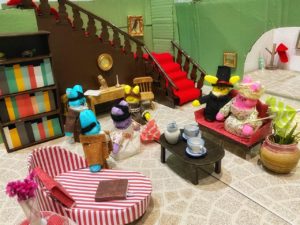
Note how Mr. Turner commands the room. (Isn’t that miniature suit amazing?)
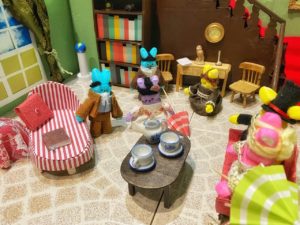
Adam and Laura both look like they would so much rather be anywhere else.
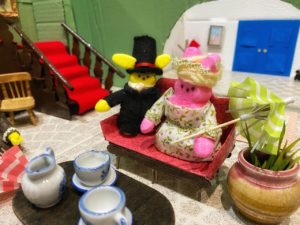
Meanwhile, the sugary tension between Nathaniel and Emily is palpable, even in Peep form. (That dress is also just the most Emily thing ever. And I’ve never seen a Peep look quite so sardonic as Nathaniel.)
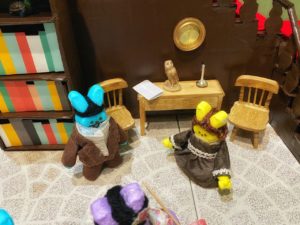
Mr. and Mrs. Turner, of course, have the situation entirely in hand, and even Laura impressed by Mrs. Turner’s latest Paris fashions.
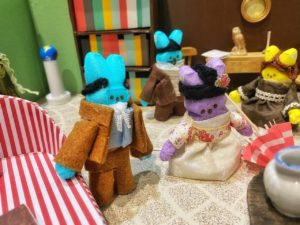
Thank you so much, Kayse, for bringing The Summer Country to life in such incredible and minute detail! I’m in love with their perfect Victorian clothes– and that staircase. Every time I look I find some new and wonderful detail that I missed the first time around.
For your amusement, here’s an excerpt from the relevant scene from The Summer Country:
They passed through a door hidden beneath the shade of a balcony. A maid servant stood aside to allow them to enter, leaving them blinking in the sudden gloom of the hall. It might have been England again, but for the fact that there were no doors to be seen; instead, arches separated a dining room and parlor from the hall. The impression was one of endless riches, the gleam of marble and wood, crystal and porcelain, spreading on as far as the eye could see.
A staircase rose before them, a smooth curve of mahogany. Emily heard a giggle and saw a whisper of white cambric, the bounce of a curl: two schoolgirls peering down through the bannisters at the guests.
A man stepped through the arch on their right. He wore a well-cut suit, his face very dark against the starched white linen of his cravat. He must, thought Emily, be a superior sort of servant. “Mr. Fenty?”
“Ah. Yes,” said Adam, and thrust his hat and gloves at the other man. “I believe your master is expecting us. If you would inform Mr. Turner—”
“My uncle,” said the other man, enunciating very clearly, in a voice that spoke of Oxbridge and private tutors, “regrets that he was not here to receive you. He should be here presently.”
“Your—” Adam stood frozen, his top hat vibrating in the air.
“If you will follow me?” said the other man curtly, and, without waiting for an answer, he strode back through the arch into the dining room.
Quietly, the maid took the hat and gloves from Adam’s hand.
“Uncle?” said Laura quietly.
“A charity child,” whispered Adam. “It must be. It’s been known to happen. A servant’s child adopted into the family….”
Mr. Turner’s nephew was waiting. Emily poked Adam in the arm. “Shall we?”
“Er, yes.” Adam scrambled after their host, half-dragging Laura with him, leaving Emily to follow along behind. “We must be—that is, we made very good time. The carriage—so well sprung. The road—so scenic. Your, er, uncle was very kind to send his own carriage.”
“My uncle,” said the other man flatly, “has several carriages.”
“Naturally. That is…. May I present you to my wife, Mrs. Fenty?” Adam said, in desperation. He dug his elbow into Laura’s ribs until she belatedly remembered to bow. “And this is my cousin, Miss Dawson. Mr., er, Turner?”
“Braithwaite.” Mr. Braithwaite bowed to Laura and to Emily, his movements as clipped as his speech. “My apologies. My aunt and uncle will be with you presently. If you would be seated?”
The settee was made of mahogany, upholstered in silk brocade that blended beautifully with the muted shades of the Aubusson rug. Bookshelves lined one side of the room, the leather bindings well-worn: natural history, history, poetry, religious works that Emily recognized from her father’s shelves. Brilliant birds, stuffed and set on stands, peered down at them from above a curio cabinet. A pier glass above the mantelpiece reflected the landscapes on the wall, the rich drapes on the windows, the flushed and uncomfortable faces of the visitors.
Emily hastily took the indicated seat. Mr. Braithwaite stood by the mantel, his very presence quelling any conversation. He had, Emily noticed, a very thin mustache above his lip. It gave him a sardonic air. Or perhaps that was just his silence, pressing down on her, reducing the proportions of the room to the size of a nutshell. A very well-appointed nutshell, but a nutshell nonetheless.
Emily popped out of her seat, bustling across the room to a curio cabinet by the mantel. “Are those fossils? My father had one, but none so fine as these.”
Mr. Braithwaite silently indicated the contents of the curio cabinet. In addition to the fossils, there was a fine collection of minerals, split to show their interiors, and shells far more beautiful than any Emily had seen when her aunt had dutifully taken them to bathe in the freezing waters of Weston-super-Mare.
Emily cleared her throat. “It is rather daunting, isn’t it? It does make one feel very small to encounter a piece of rock that has been here since before the birth of our Savior.”
“Does it?” Mr. Braithwaite’s precise inflection made Emily very aware of her own West Country accent. It had never felt so thick as it did now.
“Well, very recent, at least,” said Emily, resisting the urge to chivvy her cousin out of his seat. He could try to contribute to the conversation instead of sitting there gawking. “Were these collected on the island?”
“Yes.”
Emily was spared making further attempts by the sound of footsteps, as a man strode into the room. “Welcome, welcome.”
Mr. Turner’s deep voice resonated through the room, and, for a moment, Emily felt her breath catch at the familiarity of it, the rhythm of his speech so like her grandfather’s. It wasn’t just the accent, the accent to which her grandfather had so stubbornly held all those years, throwing his island origins in the face of Bristol’s elite; it was the air of command, the assurance that others would leap to obey, as Adam was leaping to his feet now, desperately trying to hide his chagrin as he looked anywhere but at Mr. Turner’s face.
“It is an honor to meet you, sir, ma’am” Adam stammered. “May I present my wife, and my cousin, Miss Dawson?”
Mrs. Turner murmured her own words of welcome, the rote greeting of the polished hostess. Her rose silk gown with its scalloped tiers of fabric, each edged in an intricate pattern of matching lace, was at least a season more recent than Laura’s, so beautifully tailored it had to be from Paris. Her necklace, bracelet, and earrings were of rubies set with diamonds, elegant without being gaudy. Her black hair had been dressed in a series of rolls over her ears, elegantly arranged in a chignon at the back. She looked, in fact, like one of the ladies in the fashion plates Emily’s cousins loved to study, but for one detail: the color of her skin.
Mr. Turner bowed to Laura and to Emily before turning again to Adam. “You needn’t tell me who you are. Your face is your passport in these parts. You’re the spit of your grandfather as a young man.”
“You knew my grandfather?” blurted out Adam. “I mean—that is….”
Mr. Turner raised his brow. “That you hadn’t thought your grandfather would do business with one of my complexion?”
Adam flushed. “No, certainly not. That is—”
“We’d never thought to meet anyone who knew him still,” Emily jumped in, before Adam could embarrass himself further. “Grandfather was adamant about never leaving Bristol. He hated the sea. He always thought it was a great joke that he owned a fleet of ships on which he declined to sail.” She was painfully aware that she babbling. Mr. Braithwaite was watching her as though she were the dancing bear in a carnival, and a rather mangy one at that. “We had no idea he still had friends on Barbados. After so many years.”
Mr. Turner regarded her with amused tolerance. “I was just a child when your grandfather left the island. But he was a memorable man.”
“He was that,” said Adam, a little too heartily. “How did you, er, come to meet?”
Mr. Turner smiled at Adam, and although his expression was perfectly pleasant, the room felt a little smaller. “I was the boy who held his horse. That was when I was a slave, of course.”
Adam’s mouth opened and closed. Laura sat like a marble statue, beautiful and still. Mr. Braithwaite’s lips tightened, and he looked away.
“You weren’t his slave, were you?” Emily blurted out. There were bits of his life in Barbados her grandfather had never shared; he had treated her father’s passionate involvement in the Bristol and Clifton anti-slavery society with amused contempt—but he had never failed to make a large contribution. She had never been sure if it were out of a conviction he was reluctant to voice—her grandfather had scoffed at do-gooding at the same time that he had opened his purse and his kitchen to the indigent—or merely the desire to place her father more and more firmly in his debt.
Mr. Turner gave a bark of laughter. “Jonathan Fenty? He didn’t own the clothes on his back, not in those days. No. My owner leased me to his employer.”
“That,” said Mrs. Turner, with a significant look at her husband, “is all in the past now.”
Mr. Turner held out a hand to his wife. Mrs. Turner’s hand looked pale against her husband’s, the ruby of her ring very bright. “My wife’s family have been free for some generations. I consider myself very fortunate that she lowered herself to marry me.”
His tone invited them to share the joke.
The horror of it—the barbarism—that one person might lease another, like—like a piece of farm equipment. Emily had read of it, she had attended lectures and meetings, but to hear it spoken of so frankly, by one who had, himself, been chattel— She should, Emily knew, make the appropriate noises of distress, sympathy even, express her delight that the institution was now ended, at least in this part of the world. But there was something in Mr. Turner’s countenance that blunted sympathy, that made the words tangle on her tongue.
Pop back here tomorrow for our sixth and final Pinkorama of 2020!

Great work!!
Fabulous detail! Such a wonderful peeporama 🙂
That little potted plant! Too perfect!